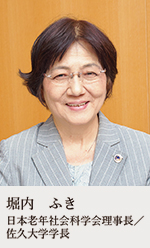→Japanese 2014/7/29 up
- Chief director greetings

- My name is Fuki Horiuchi, and I am the Chair of the Board elected in the 2018 board-of-directors election. The Japan Socio-Gerontological Society was founded in 1959 together with the Japan Geriatrics Society in anticipation of the aging of Japan’s population, making it the nation’s oldest academic society focused on the elderly. Over the next four years, I look forward to carrying on this legacy by contributing to the Society’s development and promoting our engagement in a diverse range of issues as the most significant association of gerontologists in Japan.
- Today, 27.7% of Japan’s population is over the age of 65 years (2017 figures), and in many communities, this figure is above 30%. This trend has created a range of challenges, including a declining birth rate, a rising marriage age, and a growing number of elderly people living alone or in couples. Scholars and scientists in related fields are being called on to help solve these challenges.
- Given that data show many people over 65 years old are in better health in mind and body than elderly people were twenty years ago, some have suggested changing the definition of the “elderly” to those over the age of 75 years. It is true that at 65 years old, mental and physical functioning can be as vigorous as that in a younger adult, and ability to recover from illness and surgery remains high.
- However, defining “elderly” as over 75 years old is predicted to impact many social programs and systems, including the retirement age and the pension system, and these impacts must also be carefully considered. The year this Society was founded was also the inaugural year of Japan’s universal pension system; since then, it has been debated and changed in response to the aging of the population. If the definition of “elderly” is changed, the pension system and many others will require reconsideration. As members of this Society, we must engage with the issues created by recent improvements in mental and physical functioning and take a multifaceted approach to quality of life among the elderly.
- If the mental and physical functioning of people between the ages of 65 and 74 years improves, then people in this age group need the economic resources to continue to be active in society. It is therefore critical to secure jobs for this segment of the population and think about the systems needed to support them. But those over 75 are not our sole concern: we must consider all individuals at risk of becoming frail or weak. I truly believe that the Japan Socio-Gerontological Society must approach the issues of the elderly population from a whole-society perspective.
- This Society is distinctive for its interdisciplinary character, with most of our members also active in other academic societies. While that may be one reason why our membership cannot be expected to grow, a look at our age distribution shows that many of our members are young. I believe that part of our Society’s appeal is the opportunities it offers for broadening one’s perspective, for example by receiving feedback on presentations from scholars in many different fields and specialized occupations, which in turn enables our members to make greater contributions to society through their research.
- As members of the Japan Socio-Gerontological Society, I would like us to value our interdisciplinary character and, as we move forward, to place even greater value on lively scholarly discussion between members so that we may contribute to the happiness and well-being of the elderly. I hope that all of you will join me in participating actively in our Society.
Japanese Journal of Gerontology Office work center
3-7-2, Toranomon, Minato-ku, Tokyo world planning Co., Ltd.
TEL:03-3431-3715 Fax:03-3431-3325 E-mail:rounenshakai.center@nqfm.ftbb.net
3-7-2, Toranomon, Minato-ku, Tokyo world planning Co., Ltd.
TEL:03-3431-3715 Fax:03-3431-3325 E-mail:rounenshakai.center@nqfm.ftbb.net
